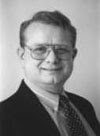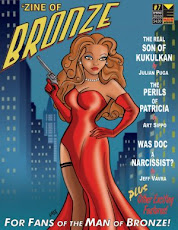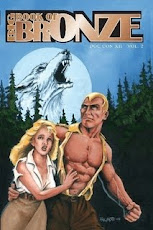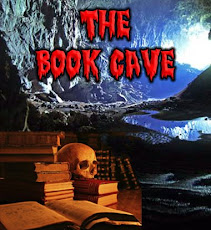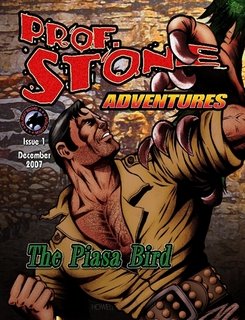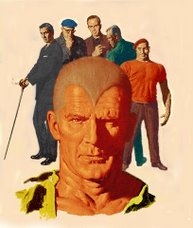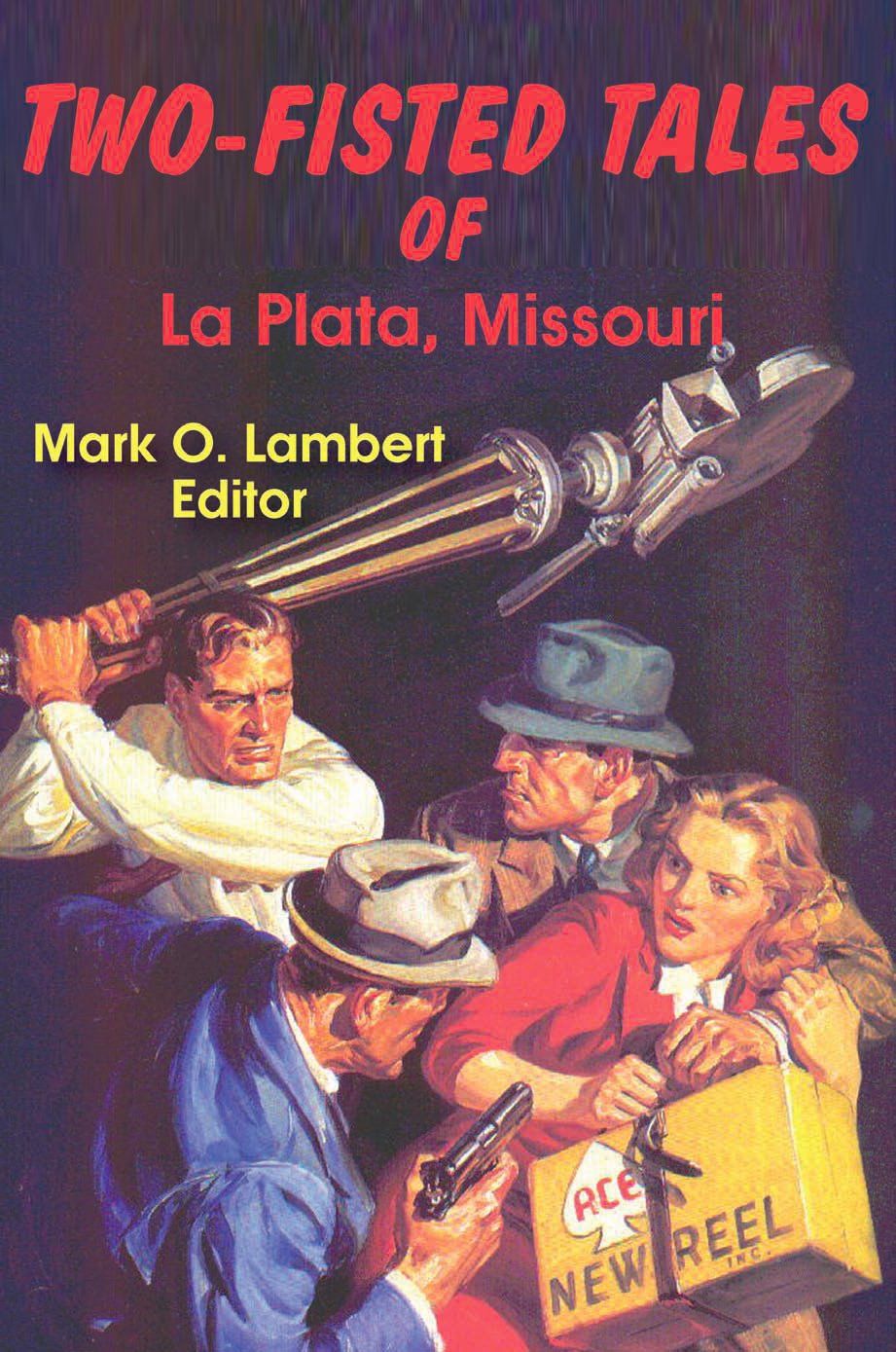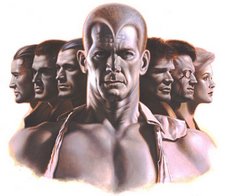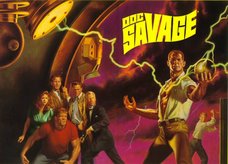In 1966 author Truman Capote wrote an intense docudrama book -- what he called a non-fiction novel -- about the 1959 mass murder of the Clutter family in the small Kansas town of Holcomb where people did not even lock their doors at night. It was entitled In Cold Blood: A True Account of a Multiple Murder and Its Consequences. The murders had been done by a couple of drifters and Capote told their story in meticulous detail. His coverage and writing of this story was the basis for the recent critically acclaimed movie Infamous (2006) which boasted an all star cast including Toby Jones, Sigourney Weaver, Daniel Craig, Sandra Bullock, Gwyneth Paltrow, Isabella Rosselini, Jeff Daniels, and Peter Bogdonavich. This was one of the best films I have seen in recent years and I recommend it highly.
In his original book, Truman Capote had a scene in the county courthouse where they are discussing the fate of the two murderers. A local minister brings up how Doc Savage would handle the case not by execution or incarceration, but by operating on the killers brains and curing them.
The Reverend Post, overhearing the conversation, joined in. "Well,"
he said, passing around a snapshot reproduction of Perry Smith's portrait of
Jesus, "any man who could paint this picture can't be one hundred percent
bad. All the same it's hard to know what to do. Capital punishment
is no answer: it doesn't give the sinner time enough to come to God.
Sometimes I despair." A jovial fellow with gold-filled teeth and a silvery
widow's peak, he jovially repeated, "Sometimes I despair. Sometimes I
think old Doc Savage had the right idea. " The Doc Savage to whom he
referred was a fictional hero popular among adolescent readers of pulp magazines
a generation ago. "If you boys remember, Doc Savage was a kind of
superman. He'd made himself proficient in every field -- medicine,
science, philosophy, art. There wasn't much old Doc didn't know or
couldn't do. One of his projects was, he decided to rid the world of
criminals. First he bought a big island out in the ocean. Then he
and his assistants --he had an army of trained assistants -- kidnapped all the
world's criminals and brought them to the island. And Doc Savage operated
on their brains. He removed the part that holds wicked thoughts. And
when they recovered they were all decent citizens. They couldn't commit
crimes because that part of their brain was out.Now it strikes me that surgery
of this nature might really be the answer to --"
A bell, the signal that the jury was returning, interrupted
him...
This reference is probably the cultural high point for Lester Dent's creation and it shows that even a pulp magazine icon may have important ramifications above and beyond the world of mere entertainment.
Tom Tryon was a handsome leading man in the 1950s and 1960s who was born in 1926 and died in 1991. He appeared in such films as The Millionaire, I Married a Monster from Outer Space, Moon Pilot, The Longest Day, Dr. Kildare , and The Cardinal. He also had a number of TV roles including that of Texas John Slaughter for The Wonderful World of Disney.
Today he is best remembered for his novels, most notably The Other (1971) and Harvest Home (1973). It is in the novel The Other that he has a Doc Savage reference in Chapter 1:
Frowning slightly, Niles carefully removed from a pocket a chameleon on a fine silver chain. He dropped it inside his shirt with the tobacco tin, then scrambled across to an upended crate partially hidden by the baskets. A divider in it held a pile of dog-eared magazines. He dug one out, then returned to the pool of light, holding it up to the flame. On the cover a man was struggling against a pack of vicious wolves, their fangs dripping gore onto the snow as they attacked a dogteam hopelessly entangled in the harness of a sled.
"'Doc Savage and the Winter Kingdom of the Akaluks,'" Niles read aloud. He peered expectantly beyond the candlelight into the dark. "Holland?"
"What?"
"I've got this idea, see? For snow."
"Snow." Holland sniggered; was always sniggering.
"Sure. Like Doc Savage and the Winter Kingdom. Remember the frozen tundra? Well, with snow we could have our own Winter Kingdom down here."
"How?" He sounded mildly curious.
"Easy. With cattails."
"Cattails? You mean bulrushes? " Guffaws.
"Sure — bulrushes. It's a good idea, no kidding. If we went down to the river and got cattails, we could shred 'em up and have snow all summer. A Winter Kingdom — huh?" He watched Holland's face while he gave it thought; somehow he was always the one to make the decisions. Certainly Niles was pleased to be with him, pleased with his company, pleased they were not only brothers but friends as well. Only, truthfully, they weren't — not really. Not that Niles didn't desire it — they just weren't close. Niles found Holland strange, unpliant, distant. Often secretive, brooding. Of a dark nature.
Holland was his own person, a loner, and who was there could do anything
about that?
Watching, Niles saw Holland's solemn wink. The Winter Kingdom was pronounced as having possibilities. He felt elated; clever, Holland had called him. In the flickering candlelight he considered how little their contemplation of each other across the dimly lighted space did to bring them closer together, though he passionately wished it. Holland was wearing his favorite pink shirt and khaki shorts rolled at the thighs. His eyes shone remote and glassy like a cat's in the night. Gray like all the Perrys', sober and deep-set under a shock of sun-whitened hair, they were oddly tilted at the corners beneath dark slanting brows, giving occasional random expressions a curiously Oriental cast; sometimes it seemed he must have come riding with Genghis Khan across the steppes from Tartary.
Niles returned the magazine to the crate and resumed his place.
When this novel was filmed in 1972, it included a scene with a shot of a paperback with the title "Doc Savage and the Winter Kingdom of the Akaluks" and a cover that was as described above. This was, of course, not a real Doc Savage novel but it was an homage in one of the premier psychological thrillers of that period.




